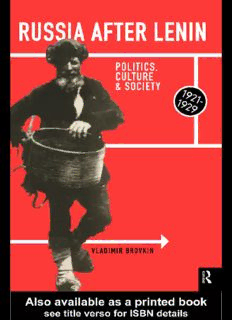
Russia After Lenin: Politics, Culture and Society, 1921-1929 PDF
Preview Russia After Lenin: Politics, Culture and Society, 1921-1929
Russia after Lenin Following the Russian Revolution, the cultural and political landscape of Russia was strewn with contradictions. The dictatorship, censorship and repression of the Communist Party existed alongside private enterprise, the black market and open debates on socialism. In Russia after Lenin, Vladimir Brovkin offers a comprehensive cultural, political, economic and social history of developments in Russia in the 1920s. By examining the contrast between Bolshevik propaganda claims and social reality, the author explains how Communist ideas were variously received, resisted and acted upon by workers, peasants, students, women, teachers and party officials. He presents a picture of cultural diversity and rejection of Communist constraints through many means including unauthorized protest, religion, jazz music and poetry. In Russia after Lenin, Brovkin argues that these trends, if left unchecked, endangered the Communist Party’s monopoly on political power. The Stalinist revolution and terror can thus be seen as a pre-emptive strike against this independent and vibrant society, as well as a product of Stalin’s personality and Communist ideology. Vladimir Brovkin is NATO Research Fellow and Adjunct Professor at the American University, in Washington DC. Russia after Lenin Politics, Culture and Society, 1921– 1929 Vladimir Brovkin London and New York by Routledge 11 New Fetter Lane, London EC4P 4EE This edition published in the Taylor & Francis e-Library, 2005. “To purchase your own copy of this or any of Taylor & Francis or Routledge’s collection of thousands of eBooks please go to www.eBookstore.tandf.co.uk.” Simultaneously published in the USA and Canada by Routledge 29 West 35th Street, New York, NY 10001 © 1998 Vladimir Brovkin All rights reserved. No part of this book may be reprinted or reproduced or utilized in any form or by any electronic, mechanical, or other means, now known or hereafter invented, including photocopying and recording, or in any information storage or retrieval system, without permission in writing from the publishers. British Library Cataloguing in Publication Data A catalogue record for this book is available from the British Library Library of Congress Cataloging in Publication Data Brovkin, Vladimir N. Russia after Lenin: Politics, Culture and Society, 1921–1929 / Vladimir Brovkin. p. cm. Includes bibliographical references and index. 1. Soviet Union—Politics and government—1917–1936. 2. Soviet Union—Civilization. 3. Soviet Union—Social conditions-1917–1945. I. Title. DK266.5.B76 1998 947.084′2–dc21 97–39751 CIP ISBN 0-203-97933-8 Master e-book ISBN ISBN 0-415-17991-2 (hbk) ISBN 0-415-17992-0 (pbk) FOR MY DEAR WIFE, ALYONA Contents List of illustrations viii List of abbreviations ix Acknowledgments xi Introduction: Revolutionary identity 1 Russian socialism 3 The Bolshevik value system 5 Utopian vision, 1917 8 Smashing the bourgeois state 10 NEP society 13 1 Extracting socially alien elements 19 Political parties and intelligentsia 20 Operation “The Living Church” 26 The “former” people 29 2 The culture of the new elite, 1921–5: ascetic knights and 37 drinking pals Old habits and new tastes 37 Educating the new party cadres 48 Dissident voices 52 3 Bolshevik actions and peasants’ reactions, 1921–5: face the 57 village, face defeat Who knew what 58 Peasant concerns 60 Strategies of coping 66 Elections, 1925 70 vi 4 Propaganda and popular belief 81 Agitprop: eradicating alien influence 81 Potemkin villages on the ideological front 84 Anti-religious campaigns 93 Popular religiosity 98 5 The Komsomol and youth: a transmission belt that snapped 107 Representations 107 Rural cells: hooliganism and drunkenness 108 Workers: vodka, sex, and defiance 112 Students: poverty, “decadence,” and dissent 125 6 Women: false promises, dashed hopes and the pretense of 133 emancipation Rural women: staying out or getting involved? 133 Factory women: from complaints to protest 141 A new Soviet woman: dating, fashions, and fox-trot 144 Bolshevik women 148 7 Towards showdown in the countryside, 1926–8 155 Rural Party: adaptation, defiant rejection, and intervention 155 Radicalization, 1926 161 Elections, 1927 164 Bolshevik dilemmas, 1928 168 8 The proletariat against the vanguard 173 New bosses, old problems, 1921–5 173 Was there an NEP in industry? 179 New radicalism, new labels, 1926–9 183 9 The Bolshevik old guard and the upstarts, 1924–9: down and 191 out and up and coming The new Communists 192 Political opinion 200 The crisis of Bolshevism 208 vii 1 0 Conclusion 213 Bolshevik culture 213 Recasting society 214 Representations 215 Social reality 216 Confidential discourse 219 Showdown 221 The culture of Sovietism 222 Notes 225 Bibliography 255 Index 263 Illustrations 1 The Three Epochs 39 2 Revolutionary Comrade 47 3 The Spring Freshet 116 4 Unfortunately, not a fairy tale 120 5 Buzutyor Special Edition on Hooliganism 120 6 The Old in the New 140 7 “Social Position” 147 8 Either Way You Lose 151 9 Warm Reception 198 10 Materialistic Approach 203 11 A Step to Grace 204 Abbreviations Agitprop Agitation and Propaganda Department of the Central Committee CC Central Committee CEC Central Executive Committee CheKa Chesvychainaya Kommissiya—Extraordinary Commission Chon Chasti Osobogo Naznacheniya—Special Purpose Units Comintern Communist International CP Communist Party EC Executive Committee GK Gorodskoi Komitet—City Committee GPU Glavnoe Politicheskoe Upravlenia—Main Political Directorate Gubkom Gubernskii Komitet—Province Committee Glavlit Glavnyi Literaturnyi Komitet—Main Literature Committee Gublit Gubernskii Literaturnyi Komitet—Province Literature section KA Komsomol archive Komsomol KSM Kommunisticheskii Soyuz Molodezhi—Communist Youth League LK Leningradskii Komitet—Leningrad Party Committee MK Moskovskii Komitet—Moscow Party Committee MRC Main Repertoire Committee—Glavrepertkom NS Narodnye Sotsialisty—People’s Socialists Orgraspred —CC Cadres Department PSR Party of Socialist Revolutionaries Proletkult Proletarskaya Kultura—Proletarian Culture RCP(b) Russian Communist Party of Bolsheviks—RKP(b) SR Socialist Revolutionary VKP(b) Vsesoyuznaya Kommunisticheskaya Partiya Bolshevikov— All-Union Communist Party of the Bolsheviks
Description: